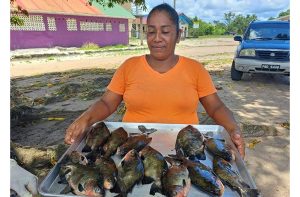President Ali tell ICCA; outlines country’s plans to involve more youths and women
BOASTING holistic plans to advance Guyana and the Caribbean Community’s (CARICOM) agricultural sector, President Dr. Irfaan Ali on Tuesday highlighted a number of ongoing initiatives to include more women and youth in the sector and adapt to newer technologies.
During a discussion with the directors of the Inter-American Institute on Cooperation in Agriculture, (IICA) including Director-General Manuel Otero, the Guyanese Head of State said the country has already embarked on a programme to ensure that 35 per cent of the newly established farms are operated by women and youth.
“We have already launched a programme in Guyana where we said we want 35 per cent of all the new farms to be owned by women and young people and we are already on target with this.”
He added: “All the new agro-phonics, shade houses that we are doing young people are involved, the marine cage project, not only young people but the indigenous communities. Teaching them how to apply technology.”
Back in 2022, President Ali launched the Agriculture and Innovation Entrepreneurship Programme (AIEP).
More than 100 young graduates of the University of Guyana and the Guyana School of Agriculture are engaged in shadehouse farming, growing crops such as broccoli, cauliflower, carrots and romaine and iceberg lettuce.
Initially, about 25 shadehouses were to be established for the cultivation of three high-value crops. However, the success of the programme prompted the government to invest further in the initiative.
By the end of 2022, 120 shadehouses were constructed to support the production. The administration aims to engage a further 100 new young ‘agri’ entrepreneurs and increase production of the crops by 50 per cent.
Aside from this project, the government also launched a poultry project which will see the rearing of black belly sheep in Guyana.
This project will target 20 per cent of women farmers and 35 per cent of young people under the age of 35.
Meanwhile, in the aquaculture sub-sector, the government has invested in marine cages to assist farmers across the country.
A marine cage is a system set up in lakes, reservoirs or ponds to confine fishes. It allows water to pass freely between the fish and the surrounding water, thus maintaining good water quality and removing waste.

This project was rolled out in hinterland communities and both women and youths are the beneficiaries of this project.
Already, farmers have reported an increase in fish catches following the implementation of the project.
In August, farmers reported a successful catch of Tamaqui fish.
Speaking further on the initiative, President Ali said: “Years ago indigenous children would use half of the day to go hunting or to go fishing to get food, now we can make marine cages; you can give them not only the food in a more profitable way but make it a livelihood opportunity for those communities.”
A MAJOR INCOME EARNER
The President further touted plans to transform the country’s agricultural sector as a major income-earner for men, women and especially young people.
He explained that government is working assiduously to position Guyana’s agricultural sector along with the food-production system into a business market for citizens.
The President said: “Agriculture is not just the production of food. For us agriculture is a business; it must be able to be competitive, it must be able to earn, it must be able to be profitable [and] it must be able to generate proposals that are bankable and make sense for the private sector.
The aim is to make the sector more attractive for women and youth.
He also reiterated Guyana’s current role in reducing the CARICOM Region’s high food-import bill.
President Ali, along with Guyana’s Agriculture Minister Zulfikar Mustapha, currently hold leadership roles in advancing the Region’s food security.
The duo are currently in Costa Rica attending IICA’s 2023 conference of Ministers of Agriculture of the Americas.


.jpg)











